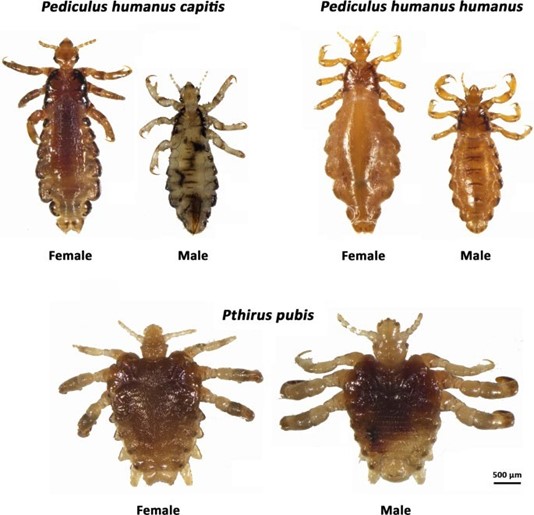A nurse in a provider's office is reinforcing teaching with the parents of a school-age child who has an active case of Pediculosis humanus capitis. Which of the following should the nurse include in the teaching?
Apply a topical corticosteroid ointment to the scalp.
Soak hair brushes and combs in soapy water.
Wash the bed linens in hot water
Clean the child's toys with 1:10 bleach solution.
None
None
The Correct Answer is C
Answer: C
Rationale:
A) Apply a topical corticosteroid ointment to the scalp: Corticosteroids are not indicated for the treatment of Pediculosis capitis (head lice). The treatment focuses on eliminating the lice and nits, typically through pediculicide medications like permethrin or ivermectin. Corticosteroids are used to reduce inflammation and itching, but they do not kill the lice or their eggs.
B) Soak hair brushes and combs in soapy water: Soaking hair brushes and combs in soapy water alone is not sufficient to kill lice. Items such as hair brushes should be soaked in hot water (130°F or higher) for at least 5-10 minutes to ensure any lice or nits present are killed. This is a critical step to prevent reinfestation.
C) Wash the bed linens in hot water: Washing bed linens in hot water (130°F or higher) is essential to eliminate lice and nits that may have transferred onto bedding. This prevents the spread and recurrence of lice. Items that cannot be washed should be sealed in a plastic bag for 2 weeks to kill the lice.
D) Clean the child's toys with a 1:10 bleach solution: Lice are spread through direct contact and cannot live on inanimate objects for long periods. Cleaning toys with bleach is unnecessary for lice removal and can be harmful to the toys or the child if not properly rinsed.

Nursing Test Bank
Naxlex Comprehensive Predictor Exams
Related Questions
Correct Answer is C
Explanation
c. Instruct the client to use abdominal breathing.
When a client is experiencing a panic atack, the nurse's first priority is to help the client manage their symptoms and provide immediate relief. Instructing the client to use abdominal breathing is the most appropriate initial intervention.
Explanation for the other options:
a. Discuss the client's feelings prior to the panic atack. While discussing the client's feelings can be beneficial in addressing the underlying causes of anxiety, it may not be the most effective immediate intervention during a panic atack. The client's focus during a panic atack is typically on managing the physical symptoms and regaining control.
b. Encourage the use of positive self-talk strategies. Positive self-talk can be helpful in managing anxiety in general, but during a panic atack, the individual may have difficulty engaging in positive self-talk due to the intensity of symptoms. Addressing the immediate physical symptoms is a priority before exploring coping strategies.
d. Administer an anti-anxiety medication. Medication administration may be necessary in some cases, but it is not the first-line intervention for managing a panic atack. Non-pharmacological interventions, such as breathing techniques, should be implemented first. If the panic atack persists or worsens despite these interventions, medication may be considered.
In summary, during a panic atack, the immediate focus should be on helping the client manage their symptoms. Instructing the client to use abdominal breathing can help promote relaxation and reduce the intensity of the panic atack.
Correct Answer is B
Explanation
b. "I should join a support group to help me be successful."
The statement that indicates an understanding of smoking cessation teaching is option b: "I should join a support group to help me be successful." Joining a support group is a beneficial strategy for quitting smoking as it provides social support, encouragement, and shared experiences with others who are also trying to quit.
Option a is incorrect because using nicotine patches does not allow for continued smoking as it delivers nicotine without the harmful effects of smoking.
Option c is incorrect because nicotine replacement therapy (NRT) is a safe and effective method to manage nicotine withdrawal and does not cause cancer.
Option d is incorrect because varenicline is a medication that helps reduce nicotine cravings and withdrawal symptoms, and it does not make a person addicted to nicotine.
Whether you are a student looking to ace your exams or a practicing nurse seeking to enhance your expertise , our nursing education contents will empower you with the confidence and competence to make a difference in the lives of patients and become a respected leader in the healthcare field.
Visit Naxlex, invest in your future and unlock endless possibilities with our unparalleled nursing education contents today
Report Wrong Answer on the Current Question
Do you disagree with the answer? If yes, what is your expected answer? Explain.
Kindly be descriptive with the issue you are facing.
